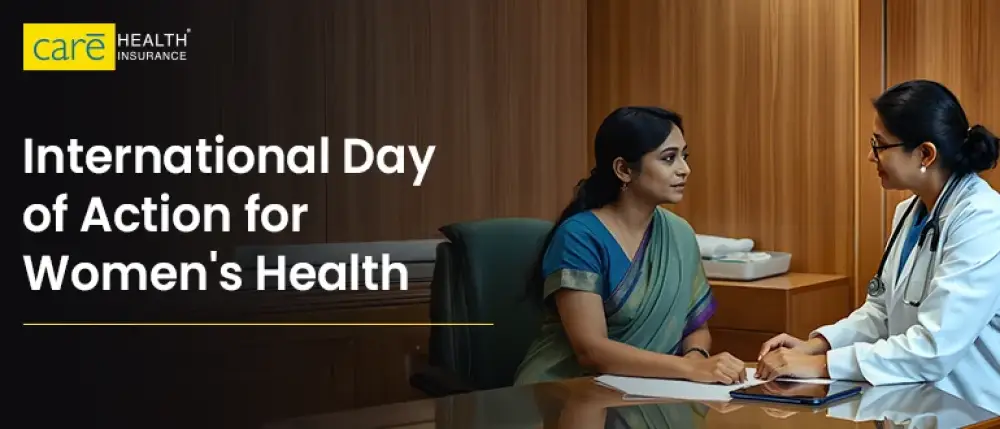On May 28, 2025, the world will focus on a critical yet often overlooked pillar of global well-being: women's health. More than just a date on the calendar, International Women's Health Day is a powerful reminder that the health of women and girls is fundamental to the health of families, communities, and nations.
This year, under the theme " In Solidarity We Resist: Our Fight, Our Right! " we are called to not only acknowledge the unique health challenges women face but to champion their right to informed decisions, comprehensive care, and a life lived in full vitality. Join us as we delve into what it truly means to empower women to nurture their physical, mental, and emotional health, creating a ripple effect of strength and resilience across the globe.
Importance of Action for Women’s Health
Here’s the thing: Gender disparities in healthcare are a thing; Access to treatments, medical experiences, and concerns do vary. Women are more vulnerable to misdiagnosis, delayed diagnosis, and under-treatment, mainly in cases of mental health, heart diseases and autoimmune disorders. Then add the fact that they also often face unique health risks, too.
Sadly, things don’t end just there.
Cultural taboos also pan out to be a factor affecting women’s health, and you can’t ignore that. From health concerns surrounding menstruation to sexual wellness to conundrums about menopause, several issues are often left unattended due to varying societal perspectives.
World Health Organization highlights that at least one in three women worldwide experience physical or sexual violence, which often boils down to long-term physical problems and mental health concerns (depression, PTSD, and more). This type of data is a fact that never made it to the headlines, but definitely hints at the importance of the International Day of Action for women’s health.
Women’s Health: Core Issues that Come into the Light
Below is a roundup of the top concerns related to women's health that come into focus today.
Breast and Cervical Cancer
Breast cancer has long been one of the most diagnosed cancers among women worldwide and accounts for 14% of cancer cases in Indian women. Cervical cancer, on the other hand, is the second most common cancer in India. While regular screenings, lifestyle choices, and early treatments can help prevent these cases from spreading, most cases escalate due to a lack of awareness.
PCOD and PCOS
Polycystic Ovary Disorder (PCOD) and Polycystic Ovary Syndrome (PCOS) are common hormonal disorders affecting many women. These conditions can lead to a range of symptoms, including irregular periods, hormonal imbalance, fertility challenges, and metabolic issues, significantly impacting a woman's quality of life.
Maternal Health
Ensuring the well-being of mothers during pregnancy, childbirth, and the postpartum period is paramount. Maternal health encompasses access to quality prenatal care, safe delivery practices, and essential post-delivery support, all crucial for the health of both mother and child.
Urinary Tract Infection
UTIs affect millions of people every year. However, women are more prone to this issue due to anatomical differences. About 50-60% of women experience a UTI at least once in their lifetime. And why? It’s because of lifestyle factors like poor sanitation, lack of awareness about menstrual hygiene, and stigma around gynaecological health in many countries.
Mental Health
Women often face unique mental health challenges, including higher rates of depression and anxiety, influenced by societal pressures, hormonal fluctuations, and various life stages. Promoting mental well-being, self-care, reducing stigma, and ensuring access to support are essential for holistic women's health.
How Can You Contribute to the Change?
When it comes to driving change, every little contribution counts. Here are some tips on adding value to the International Day of Action for Women's Health.
- Educate yourself and others: Learn and talk about health concerns in women, like breast cancer, cervical cancer, PCOS, mental health, UTIs, and menstruation.
- Encourage routine checkups: Leverage platforms like social media and organisations to promote the importance of screenings and medical tests. This goes especially for conditions like breast cancer, cervical cancer, PCOS, and reproductive health concerns.
- Support health initiatives led by women: Volunteer with organisations that work on the ground. Even an Instagram repost can nudge people to reflect on the issues and start the talk.
- Empower young girls early: Initiate conversations about self-care, mental health, menstrual hygiene, and emotional resilience early on. Understanding women’s health concerns from an early age can change the picture
- Promote the importance of safety nets like health insurance: While awareness and a proactive mindset are non-negotiable, the right health coverage is also crucial for ensuring every woman can navigate medical care when required, without financial constraints. One plan can remove a good share of worries from the scenario.
Final Thoughts
International Day of Action for Women’s Health is not just another date on the calendar. It is a stark reminder to act against various factors that directly or indirectly push many women into the trap of serious health issues. From lack of awareness about cervical and breast cancer to cultural views of menstruation and menopause, the list of ‘what’s wrong’ is pretty strong. While comprehensive health insurance plans by Care Health, for example, offer many benefits for women’s health treatment expenses, it doesn’t reduce the importance of addressing the challenges that give rise to serious issues.
Disclaimer: All plan features, benefits, coverage and claims underwriting are subject to policy terms and conditions. Kindly refer to the brochure, sales prospectus and policy documents carefully.
